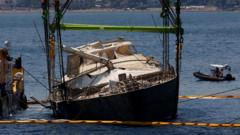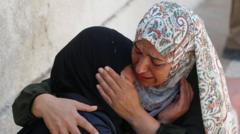As of June 13, 2025, Iranian ballistic missiles have hit at least seven sites in Tel Aviv, causing injuries and damage. This retaliatory action follows Israeli airstrikes that targeted Iran's nuclear facilities, including a significant attack on the Natanz enrichment site, drawing international concern and condemnation.
**Escalation in the Middle East: Iran Strikes Back Following Israeli Attacks**

**Escalation in the Middle East: Iran Strikes Back Following Israeli Attacks**
Tension escalates as Iran retaliates against Israeli airstrikes targeting its nuclear facilities, with missile strikes hitting multiple locations in Tel Aviv.
In a dramatic escalation, Iranian military forces launched missiles at Tel Aviv, injuring at least 22 people and causing damage to several buildings, including one housing military facilities. Videos from the city captured the moment of impact, alongside the responses from Israeli defense systems. The immediate attacks come in retaliation for Israeli strikes which destroyed key nuclear infrastructure in Iran, including the above-ground enrichment plant in Natanz, according to Rafael Grossi, head of the International Atomic Energy Agency (IAEA). Unofficial reports indicated that Iranian strikes resulted in 78 deaths and hundreds of injuries within Iran, underscoring the severe toll of the quickening conflict.
In response to the Iranian missile strikes, Israeli Defense Minister Israel Katz declared that the Iranian regime “crossed a red line” and promised that “the Ayatollah regime would pay a very heavy price” for its actions. Israeli military officials noted that a significant portion of the incoming missiles were intercepted by its Iron Dome defense system, which has been critical in safeguarding civilian areas.
The United States played a role in assisting Israel’s missile defense by providing military support to intercept some incoming Iranian rockets. As violence spikes, global leaders have expressed deep concerns over the potential for a wider conflict, urging all parties to show restraint. President Trump held conversations with Prime Minister Netanyahu, emphasizing Israel's right to defend itself while also calling on diplomatic solutions to prevent further escalation.
International responses varied, with some European leaders expressing concerns about the rapid military escalation and advocating for de-escalation strategies. In contrast, allies like the U.S. and certain Gulf states, while alarmed by Iran's support of militias, generally affirmed Israel's military actions in response to a perceived existential threat.
The situation remains fluid, as diplomatic efforts intensify to contain what could become an all-out conflict in a region that has seen decades of tension. Observers are keenly watching for further Iranian responses, particularly from its network of regional proxies, and how Israel might continue its campaign against Iran's nuclear ambitions in the coming days.
Experts warn that the dynamics are significant, with psychological impacts on both side's populations potentially leading to further instability across the Middle East. As missile exchanges become more frequent, the world remains on alert for an escalation that could envelop the region in broader warfare.
In response to the Iranian missile strikes, Israeli Defense Minister Israel Katz declared that the Iranian regime “crossed a red line” and promised that “the Ayatollah regime would pay a very heavy price” for its actions. Israeli military officials noted that a significant portion of the incoming missiles were intercepted by its Iron Dome defense system, which has been critical in safeguarding civilian areas.
The United States played a role in assisting Israel’s missile defense by providing military support to intercept some incoming Iranian rockets. As violence spikes, global leaders have expressed deep concerns over the potential for a wider conflict, urging all parties to show restraint. President Trump held conversations with Prime Minister Netanyahu, emphasizing Israel's right to defend itself while also calling on diplomatic solutions to prevent further escalation.
International responses varied, with some European leaders expressing concerns about the rapid military escalation and advocating for de-escalation strategies. In contrast, allies like the U.S. and certain Gulf states, while alarmed by Iran's support of militias, generally affirmed Israel's military actions in response to a perceived existential threat.
The situation remains fluid, as diplomatic efforts intensify to contain what could become an all-out conflict in a region that has seen decades of tension. Observers are keenly watching for further Iranian responses, particularly from its network of regional proxies, and how Israel might continue its campaign against Iran's nuclear ambitions in the coming days.
Experts warn that the dynamics are significant, with psychological impacts on both side's populations potentially leading to further instability across the Middle East. As missile exchanges become more frequent, the world remains on alert for an escalation that could envelop the region in broader warfare.























